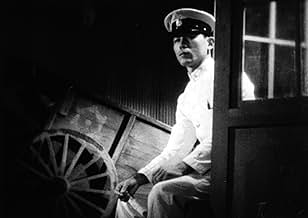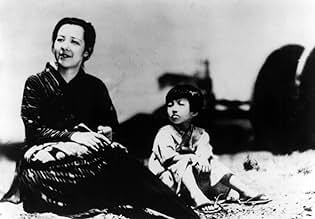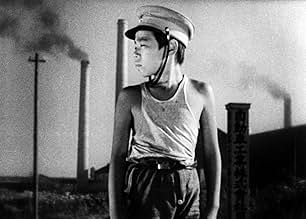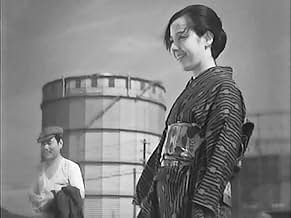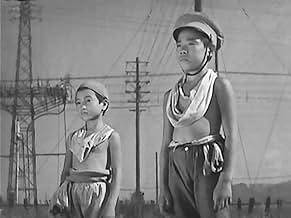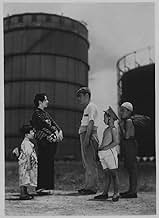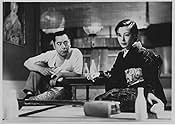AVALIAÇÃO DA IMDb
7,4/10
1,8 mil
SUA AVALIAÇÃO
Adicionar um enredo no seu idiomaUnemployed Kihachi and his two sons struggle to make ends meet. But that doesn't keep Kihachi from wooing single mother Otaka.Unemployed Kihachi and his two sons struggle to make ends meet. But that doesn't keep Kihachi from wooing single mother Otaka.Unemployed Kihachi and his two sons struggle to make ends meet. But that doesn't keep Kihachi from wooing single mother Otaka.
- Direção
- Roteiristas
- Artistas
- Direção
- Roteiristas
- Elenco e equipe completos
- Produção, bilheteria e muito mais no IMDbPro
Avaliações em destaque
This early great work from The Master is a sobering melodrama honed squarely on a single unemployed, homeless father struggling to feed and shelter his two sons. Ozu does a fine job capturing the dynamic between the two boys by themselves and with their father, but the film really gets interesting when two women enter the story: a young single mother, also homeless, and an old friend who finds the father a job. The maudlin climax seems to anticipate Ford's GRAPES OF WRATH and DeSican melodrama -- though in the wrong ways -- but prior to that Ozu comes up with an quirky expressionist sequence to reflect the father's unraveling moral state.
This is a silent film by Ozu, and it is brilliant both in its simple telling of the story and its development of the characters. This film is about a father, Kihachi, who has two small sons and is looking for work, so they can eat. He meets a young mother with a daughter and for a while she is out of the film. Near the end of his rope, he runs into an old female friend, who finds work for him and enables the boys to go to school. The young mother has come to the town with her daughter and he looks to help her, but is also interested in her. As simple as this sounds, the film is wrought with emotion, and is brilliant in that your own thoughts could be somewhat mixed about this. Shouldn't he be more grateful to the (female) friend who helped him find work? One of Ozu's best qualities is to show sadness, happiness and fear in its most basic, raw forms. The acting, even by the children, is uniformly wonderful. Even Mr. Ryu, whom I believe to be one of the greatest if not the greatest character actors in film history, is in this film in a small role. Ozu's films are methodically slow moving mostly, this one included, but I have always felt that prospective film makers should study his work to understand the virtues of simplicity in telling a story on film. Up there with Ozu's best. Possibly not as good as "Tokyo Story" and "Late Spring" but very highly recommended.
Ozu was really on the verge of discovery at the time, having experimented for a few years. I believe this is why he continued in the silent format longer than his peers, fearing sound would pose demands on the visual experience he was hoping to cultivate. So he was looking for an eye that is quiet but attentive, alert, seeing with a kind of vital emptiness.
Focus would be his exercise. In place of more rigorous form, he had discovered a few motifs he knew carried resonance - vast rolling skies, floating weeds, fireworks - and was content to use that as spontaneous blossoms of insight amid languid flows.
And he had an optimism that was touching, faith in a secular way. His characters really grew to a point of sublime selflessness but did so out of common sense and remained distraught, human.
So there is a lot of sense in early Ozu, in both meanings of the word, and this is why I value him.
But I wish he was bolder at the same time. And this is because the first 30 minutes are unusually sparse, even by standards he was developing, and just look at how simply he paints contemporary Japan with one stroke, a father with two raggedy kids to feed, unemployed in the middle of a sunbaked plain littered with factories, but in the latter stages turns into conventional drama that resolves theatrically, and even worse is a rehash of his Floating Weeds from the previous year.
So he was finding ways to handle emptiness but was still thinking in terms of balanced, old-fashioned storytelling. His eye was looking to see clearly but did not see itself.
The juxtaposition is striking and disappoints more, especially by comparison to the likes of Mizoguchi and Naruse who were coming up with clever ways to annotate the artifice of their melodrama. Ozu's unfolds at face value, provincial in its earnestness.
Asymmetry is what is lacking here. Imbalance that reflects a world unfettered by narratives.
Focus would be his exercise. In place of more rigorous form, he had discovered a few motifs he knew carried resonance - vast rolling skies, floating weeds, fireworks - and was content to use that as spontaneous blossoms of insight amid languid flows.
And he had an optimism that was touching, faith in a secular way. His characters really grew to a point of sublime selflessness but did so out of common sense and remained distraught, human.
So there is a lot of sense in early Ozu, in both meanings of the word, and this is why I value him.
But I wish he was bolder at the same time. And this is because the first 30 minutes are unusually sparse, even by standards he was developing, and just look at how simply he paints contemporary Japan with one stroke, a father with two raggedy kids to feed, unemployed in the middle of a sunbaked plain littered with factories, but in the latter stages turns into conventional drama that resolves theatrically, and even worse is a rehash of his Floating Weeds from the previous year.
So he was finding ways to handle emptiness but was still thinking in terms of balanced, old-fashioned storytelling. His eye was looking to see clearly but did not see itself.
The juxtaposition is striking and disappoints more, especially by comparison to the likes of Mizoguchi and Naruse who were coming up with clever ways to annotate the artifice of their melodrama. Ozu's unfolds at face value, provincial in its earnestness.
Asymmetry is what is lacking here. Imbalance that reflects a world unfettered by narratives.
Ozu's final surviving silent film (College is a Nice Place seems to be both silent and lost), An Inn in Tokyo feels more like a return to socially conscious filmmaking from the Japanese director, more bluntly dealing with poverty as a central motif than he had in A Story of Floating Weeds where the poverty felt more situational and tied to character. Ultimately, the film ends up working very well, but An Inn in Tokyo kind of feels like Ozu taking a step backwards, trying to be timely rather than pursuing his own stories.
The second movie featuring the character Kihachi (Takeshi Sakamoto) who first appeared in Ozu's Passing Fancy, the story is about the single dad trying to find work while penniless and in charge of his two boys, Zenko (Tokkan Kozo) and Masako (Takayuki Suematsu). He can work a lathe, but no one will hire him, and the family of three have to choose whether to sleep in a field and eat or to sleep in the titular inn and not eat every night in order to save what little money they have. When Zenko spends a chunk of their remaining cash on a hat for himself, their dire situation is made all the worse. And Kihachi can't get mad. They're just kids. It's not their fault. He's responsible for them, and it's his fault that they're having to choose between food and a roof over their heads, with dwindling resources every day.
They're joined by Otaka (Yoshiko Okada) and her daughter Kimiko (Kazuko Ojima), another parent/child impoverished pair who wander the fields of the industrial area outside of Tokyo. Kihachi's salvation, though, comes from an old friend, Otsune (Choko Iida), who owns a small tea shop and can provide him and his boys (and quickly thereafter Otaka and her girl) with a place to sleep and some food.
What's interesting about the character journey here is that it's a realization on the part of Kihachi that...he shouldn't be a father. He can't take care of his own children, and he makes all of the wrong decisions to the point where he decides that his kids are better off being raised by someone else. It's the sort of realization that hurts once it comes, but come it does.
The path is around Otaka disappearing for a while when she gets a job, Kihachi taking it quite badly, and Kihachi, gotten a job through Otsune's influence, deciding that he needs to take drastic measures to help Otaka when she reveals that Kimiko is having health problems.
His string of decisions leads to that quiet ending where Kihachi has to reflect on what he's become, looking mournfully at people he's betraying to do what he thinks is right, and making his big choice about his family's future. That Kihachi has been so well-drawn, the situation so well established, and the supporting characters so well integrated that there's real emotional weight to those final moments. It's an accomplished ending that actually does move me.
I just feel like the opening is kind of heavy-handed with the portrait of poverty. Which is a contrast to A Story of Floating Weeds where the poverty felt so easily integrated, even while the portrait of the acting troupe's poverty was so instrumental to the drama of the story working out. Maybe it's simply a factor of how long Ozu wallows in the poverty at the beginning of An Inn in Tokyo. There's little else for the first twenty minutes or so. There are far fewer characters and far fewer things for the characters we do have to do (the deal with the hat essentially gets repeated when Zenko and Masako argue over carrying a bag, just leaving it on the road and walking away as their solution).
So, the opening is drawn out and slightly repetitive, but at the halfway point, Ozu brings things into the proper gear and moves along at the right pace to get us to the emotional climax. It's almost like he didn't quite have enough story idea and his cowriters (Masao Arata and Tadao Ikeda) didn't know how to fill that opening act with enough material. Still, the overall package has the right kind of punch, a very good way for Ozu to say goodbye to the silent period (again, minus College is a Nice Place).
Still, he's been aching for the sound period for a while. Characters really need to speak. It's time.
The second movie featuring the character Kihachi (Takeshi Sakamoto) who first appeared in Ozu's Passing Fancy, the story is about the single dad trying to find work while penniless and in charge of his two boys, Zenko (Tokkan Kozo) and Masako (Takayuki Suematsu). He can work a lathe, but no one will hire him, and the family of three have to choose whether to sleep in a field and eat or to sleep in the titular inn and not eat every night in order to save what little money they have. When Zenko spends a chunk of their remaining cash on a hat for himself, their dire situation is made all the worse. And Kihachi can't get mad. They're just kids. It's not their fault. He's responsible for them, and it's his fault that they're having to choose between food and a roof over their heads, with dwindling resources every day.
They're joined by Otaka (Yoshiko Okada) and her daughter Kimiko (Kazuko Ojima), another parent/child impoverished pair who wander the fields of the industrial area outside of Tokyo. Kihachi's salvation, though, comes from an old friend, Otsune (Choko Iida), who owns a small tea shop and can provide him and his boys (and quickly thereafter Otaka and her girl) with a place to sleep and some food.
What's interesting about the character journey here is that it's a realization on the part of Kihachi that...he shouldn't be a father. He can't take care of his own children, and he makes all of the wrong decisions to the point where he decides that his kids are better off being raised by someone else. It's the sort of realization that hurts once it comes, but come it does.
The path is around Otaka disappearing for a while when she gets a job, Kihachi taking it quite badly, and Kihachi, gotten a job through Otsune's influence, deciding that he needs to take drastic measures to help Otaka when she reveals that Kimiko is having health problems.
His string of decisions leads to that quiet ending where Kihachi has to reflect on what he's become, looking mournfully at people he's betraying to do what he thinks is right, and making his big choice about his family's future. That Kihachi has been so well-drawn, the situation so well established, and the supporting characters so well integrated that there's real emotional weight to those final moments. It's an accomplished ending that actually does move me.
I just feel like the opening is kind of heavy-handed with the portrait of poverty. Which is a contrast to A Story of Floating Weeds where the poverty felt so easily integrated, even while the portrait of the acting troupe's poverty was so instrumental to the drama of the story working out. Maybe it's simply a factor of how long Ozu wallows in the poverty at the beginning of An Inn in Tokyo. There's little else for the first twenty minutes or so. There are far fewer characters and far fewer things for the characters we do have to do (the deal with the hat essentially gets repeated when Zenko and Masako argue over carrying a bag, just leaving it on the road and walking away as their solution).
So, the opening is drawn out and slightly repetitive, but at the halfway point, Ozu brings things into the proper gear and moves along at the right pace to get us to the emotional climax. It's almost like he didn't quite have enough story idea and his cowriters (Masao Arata and Tadao Ikeda) didn't know how to fill that opening act with enough material. Still, the overall package has the right kind of punch, a very good way for Ozu to say goodbye to the silent period (again, minus College is a Nice Place).
Still, he's been aching for the sound period for a while. Characters really need to speak. It's time.
10kerpan
I would argue that "Tokyo no yado" (Inn at Tokyo) is not only one of Ozu's best films, but one of the best films by anyone ever. It tells the story of an unemployed and homeless single father (Takeshi Sakamoto) with two sons (the elder of the two being the wonderful Tomio Aoki) looking for work in depression-era Tokyo, whose lives intersects with those of a single mother (the marvelous Yoshiko Okada) of a little daughter likewise forlornly seeking a way (and a place) to live. The children can find moments of happiness in the undustrial wasteland -- and their parents can briefly recollect their own happiness as children. The boys have a brief idyll, after their father gets a job with the help of an old friend (Choko Iida), even getting to go to school (a pleasure they value almost as much as having a fixed home and a dependable supply of food). Things, however, become troubled again when the family loses track of the mother and girl (who have not found any "angel" to help them out). A film that is strikingly beautiful -- and more than a little heart-breaking. It is marred by a tiny section that seems overly melodramatic right before the end (but this might be due to infelicities of the intertitles -- or at least of their translation).
Você sabia?
- CuriosidadesThe credits indicate that the script was based on an original work by a foreign writer with a name that sounds like "Winzart Monet", but it is actually a gag name, derived from "without money".
- ConexõesFeatured in A Story of Children and Film (2013)
Principais escolhas
Faça login para avaliar e ver a lista de recomendações personalizadas
Detalhes
- Data de lançamento
- País de origem
- Idioma
- Também conhecido como
- Um Hotel Em Tóquio
- Empresa de produção
- Consulte mais créditos da empresa na IMDbPro
- Tempo de duração1 hora 19 minutos
- Cor
- Mixagem de som
- Proporção
- 1.37 : 1
Contribua para esta página
Sugerir uma alteração ou adicionar conteúdo ausente

